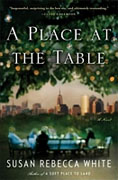A Place at the Table
Susan Rebecca White
book reviews:
· general fiction
· chick lit/romance
· sci-fi/fantasy
· graphic novels
· nonfiction
· audio books
· author interviews
· children's books @
curledupkids.com
· DVD reviews @
curledupdvd.com
newsletter
win books
buy online
links
home
for authors
& publishers
for reviewers

 |
A Place at the Table Susan Rebecca White Touchstone Hardcover 336 pages June 2013 |
|
In White’s tenderhearted novel, lives are lived through a particular set of circumstances and bound by time, place, and fate—however familiar or strange that context may seem, White allows us to learn intimately what it was like to experience the trajectory of a particular life as though we had lived it ourselves. This is the beauty and strength of A Place at the Table
In 1970s Decatur, Georgia, young Bobby is hounded by his older brother, Hunter, for being gay. Hunter says he acts like “a sissy” and talks with a lisp, yet Bobby has no other choice. Growing up with "a head full of boys," his gay identity starts to emerge in the flux of his friends and schoolmates. When he enters Decatur High School, he’s mesmerized by a boy named Pete, and even cold sober it is all he can do not to reach and touch him. To the delicate strains of “The Songbird,” Bobby is overwhelmed by adolescent lust, the song becoming a celebration of love so clear and true. Yet Bobby can’t quite cope with the fallout from his forbidden desires, so used he is to sneaking glances at this beautiful boy with long eyelashes who is captain of the football team. White creates a world of heavy air where the weight of past grief bears down on each of the characters as they bob and weave through often precarious circumstances. When Bobby’s tranquil domestic world of Fourth of July picnic suppers and afternoons at Clairmont Avenue Baptist falls apart, he stays with his grandmother, the kindly Meemaw who lives on the other side of the railroad tracks. For Bobby, there’s a constant sense of innocence laced with sexual longing where such desires aren’t real or true: “they’ve come from messed-up wiring in my brain that I need to ignore.” Yet Bobby is surprised when his grandmother creates for him a surprising opportunity that she cautions will change his life in ways he could never have imagined. White surprised me in this novel. She’s nothing if not frank about sex, which gives great strength to her story, and her explicit descriptions of the particular manifestations of the AIDS illness leave nothing to the imagination. In New York City in the summer of 1981, Bobby must use his common sense to figure out how to survive and make a life for himself. Luckily, he has the help of Gus Andres, the owner and namesake of the intimate Café Andres, where Bobby can take his grandmother’s recipes and combine them in a totally new way to make them appeal to a new and sophisticated city clientele. What is important in this novel is how White’s characters embark on their own discovery of themselves. In Old Greenwich, Connecticut, in 1989, Amelia feels “unseen.” She can’t quite cope with her husband’s fury towards her, Cam’s nights of rage and inability to see anything from her side. Amid allegations of an affair, Amelia stumbles upon a book written by Alice Stone, who grew up on a farm in rural North Carolina. Alice went on to be a chef at an Eastside café, where Amelia’s beloved Aunt Kate liked to take the author to lunch. The restaurant itself has a storied literary past and continues to attract a bohemian clientele. Food, wine, and the love of fine dining are the pivotal links that bind these people together as White flips vantage points between Bobby, Alice, and Amelia. In the present-day perspective, lives come full circle and family secrets are eventually exposed. While some readers may find the resolutions a far-fetched, they will value this charming novel for its tenderness, intimacy, and a love which could only have arisen from the specter of profound loss and heartache. Originally published on Curled Up With A Good Book at www.curledup.com. © Michael Leonard, 2013 |
|
|
|
 Click here to learn more about this month's sponsor! |
|
| fiction · sf/f · comic books · nonfiction · audio newsletter · free book contest · buy books online review index · links · · authors & publishers reviewers |
|
| site by ELBO Computing Resources, Inc. | |
 Combining evocative language with fast-paced action, White shows siblings James and Alice living in an emancipation Township in 1929 North Carolina. Like their beloved granddaddy, they experience a pride that comes from working in a community owned and run by Negroes. But this is still a world of routine racism and violent lynchings. When the children stumble upon a boy hanging from a rope with his head tilted back and chin pointed toward the sky, James is no longer considered safe on the farm and is hurriedly packed off to relatives in New York City.
Combining evocative language with fast-paced action, White shows siblings James and Alice living in an emancipation Township in 1929 North Carolina. Like their beloved granddaddy, they experience a pride that comes from working in a community owned and run by Negroes. But this is still a world of routine racism and violent lynchings. When the children stumble upon a boy hanging from a rope with his head tilted back and chin pointed toward the sky, James is no longer considered safe on the farm and is hurriedly packed off to relatives in New York City.